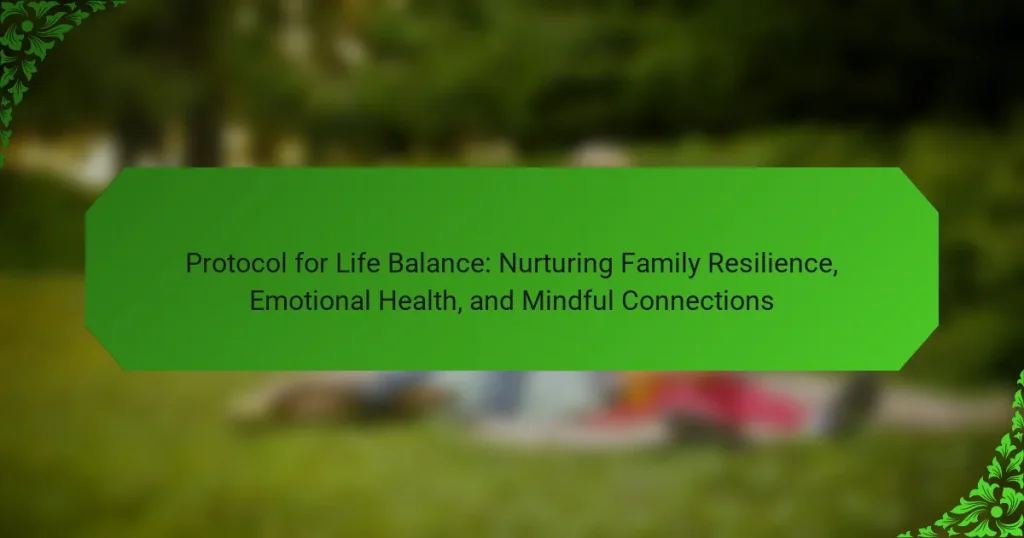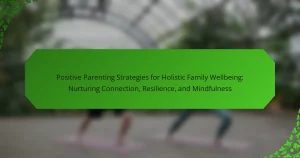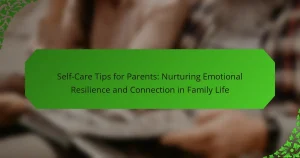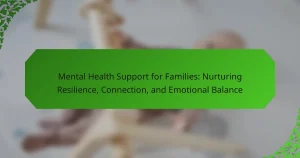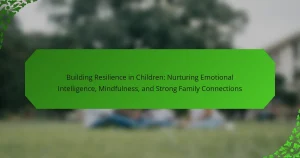Enhancing family resilience and emotional health is essential for navigating life’s challenges. The Protocol for Life Balance focuses on fostering mindful connections through structured routines and open communication. This holistic approach promotes emotional awareness and shared activities, ultimately strengthening family bonds. By implementing tailored strategies, families can cultivate a supportive environment and improve overall well-being.

What is the Protocol for Life Balance?
The Protocol for Life Balance focuses on enhancing family resilience, emotional health, and fostering mindful connections. This holistic approach integrates practices that promote well-being and strengthen family bonds. It encourages open communication, emotional awareness, and shared activities, which are essential for nurturing relationships. By prioritising these aspects, families can effectively navigate challenges and build a supportive environment.
How does it support family resilience?
The Protocol for Life Balance supports family resilience by fostering emotional health and mindful connections. It provides structured approaches that enhance communication, strengthen relationships, and promote shared experiences. Families practising these protocols report improved coping strategies during stress, leading to greater unity and support. The programme emphasises unique attributes such as emotional awareness and collective mindfulness, which are crucial for navigating challenges together. As a result, families become more adaptable and better equipped to face adversities, reinforcing their resilience.
What role does emotional health play in family dynamics?
Emotional health significantly influences family dynamics by fostering resilience and enhancing communication. Healthy emotional states promote understanding and support among family members, reducing conflict and strengthening bonds. Families with strong emotional health exhibit better coping strategies during stress, leading to improved overall well-being. As a result, nurturing emotional health is essential for creating mindful connections and a harmonious family environment.
What are the key components of emotional health?
Key components of emotional health include self-awareness, emotional regulation, resilience, and interpersonal relationships. These aspects contribute to overall well-being and effective coping strategies. Self-awareness enables individuals to recognise their emotions, while emotional regulation involves managing those feelings constructively. Resilience allows for recovery from setbacks, and strong interpersonal relationships provide support and connection. Prioritising these components fosters a balanced emotional state, essential for personal growth and family resilience.
How can mindful connections enhance family relationships?
Mindful connections significantly enhance family relationships by fostering understanding and empathy. These connections promote open communication, allowing family members to express emotions and needs effectively. As a result, families experience improved emotional health and resilience. Engaging in mindful practices, such as active listening and shared activities, cultivates a supportive environment. This approach leads to stronger bonds and a sense of belonging among family members. Additionally, families that prioritise mindfulness report higher levels of satisfaction and reduced conflict.
What practices foster mindful connections?
Mindful connections are fostered through active listening, empathy, and open communication. Engaging in shared activities strengthens bonds and enhances emotional health. Establishing routines for family interactions promotes resilience and connection. Regular check-ins and expressing gratitude further nurture these relationships.

What are the universal benefits of the Protocol for Life Balance?
The universal benefits of the Protocol for Life Balance include enhanced family resilience, improved emotional health, and strengthened mindful connections. These benefits foster a supportive environment, promoting effective communication and emotional understanding. Families practising this protocol report reduced stress levels and increased overall well-being. As a result, they develop healthier relationships and a more cohesive family dynamic.
How does it promote overall family wellbeing?
The Protocol for Life Balance promotes overall family wellbeing by enhancing resilience, emotional health, and mindful connections. It fosters a supportive environment where families can communicate effectively, manage stress, and nurture relationships. Engaging in shared activities strengthens bonds and encourages collaboration. Research indicates that families practising these protocols report higher satisfaction and lower anxiety levels, contributing to a healthier family dynamic.
What are the long-term impacts on emotional health?
Long-term impacts on emotional health include improved resilience, enhanced relationships, and better coping strategies. These benefits stem from consistent practices in nurturing family connections and mindfulness. Research indicates that emotional health significantly influences overall well-being, leading to lower stress levels and increased life satisfaction. Engaging in supportive family dynamics fosters a sense of belonging, which is crucial for long-term emotional stability.

What unique features distinguish this protocol?
The Protocol for Life Balance features a holistic approach that integrates family resilience, emotional health, and mindful connections. Its unique attribute lies in its emphasis on nurturing relationships through structured activities and reflective practices. Additionally, it offers tailored strategies for different family dynamics, enhancing adaptability and engagement. The protocol also incorporates evidence-based techniques, promoting sustainable emotional well-being across various life stages.
How does it integrate holistic approaches?
The Protocol for Life Balance integrates holistic approaches by combining emotional health, family resilience, and mindful connections. This framework emphasises the interconnectedness of mental well-being and family dynamics. It encourages practices like mindfulness and emotional intelligence to strengthen relationships. As a result, families develop resilience against stressors and enhance their overall quality of life. This unique approach fosters a supportive environment that nurtures individual and collective growth.
What specific strategies are employed for family engagement?
Effective strategies for family engagement focus on fostering emotional health and resilience. These strategies include regular family meetings to discuss feelings, shared activities that promote bonding, and open communication to strengthen connections. Additionally, implementing mindfulness practices, such as family meditation or gratitude exercises, enhances emotional well-being. Encouraging family members to express their needs and concerns creates a supportive environment, reinforcing family resilience.

What rare attributes contribute to its effectiveness?
The rare attributes contributing to the effectiveness of the Protocol for Life Balance include its holistic approach, individualised strategies, and integration of mindfulness practices. These attributes enhance emotional resilience, foster family connections, and promote mental well-being. The protocol emphasises personalised interventions, which are often rare in conventional programmes, allowing for tailored support that meets unique family dynamics. Additionally, the emphasis on mindfulness practices cultivates deeper emotional awareness, leading to more effective communication and connection among family members.
What innovative practices are included in the protocol?
The protocol includes innovative practices that enhance family resilience and emotional health through mindful connections. Techniques such as structured family discussions, emotional check-ins, and shared mindfulness activities foster deeper relationships. Additionally, the integration of technology for virtual family gatherings supports ongoing connections. These practices emphasise emotional intelligence, communication skills, and mutual support, creating a holistic approach to nurturing family dynamics.
How does the protocol adapt to individual family needs?
The protocol adapts to individual family needs by offering customisable strategies and practices. Families can select specific activities that align with their unique emotional health goals and resilience-building objectives. This flexibility ensures that each family’s dynamics and values are respected, promoting mindful connections. Additionally, the protocol incorporates feedback mechanisms, allowing families to refine their approach based on ongoing experiences and outcomes. This adaptability enhances engagement and effectiveness, ultimately fostering a supportive environment for emotional growth.
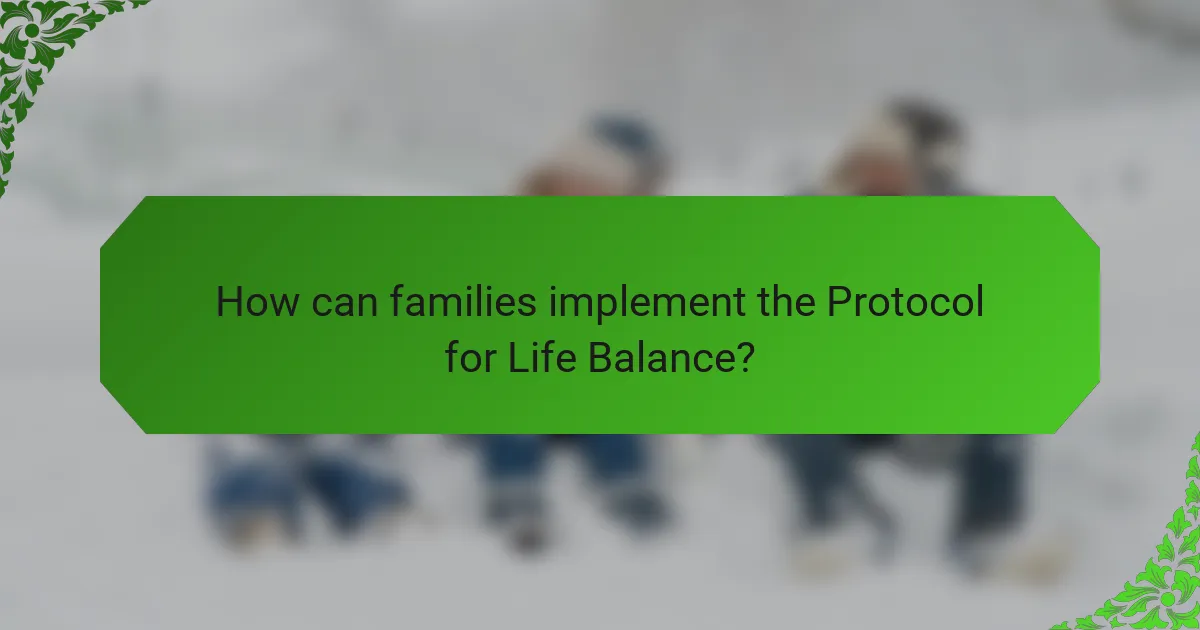
How can families implement the Protocol for Life Balance?
Families can implement the Protocol for Life Balance by integrating structured routines, open communication, and shared activities. Establishing regular family meetings fosters emotional health and resilience. Incorporating mindfulness practices, such as meditation or nature walks, strengthens connections. Prioritising quality time enhances relationships and promotes a supportive environment. Engaging in collaborative projects encourages teamwork and shared responsibility, reinforcing family unity.
What steps should families take to get started?
To get started, families should establish open communication, set shared goals, and create routines that promote emotional health. First, encourage family members to express their feelings regularly. Next, collaboratively define goals that enhance resilience, such as spending quality time together. Lastly, implement daily or weekly rituals, like family meals or game nights, to strengthen connections and mindfulness.
What resources are available for families?
Families can access various resources to enhance resilience and emotional health. These include community support groups, online workshops, family therapy services, mindfulness programmes, and educational materials focused on emotional well-being. Engaging in these resources fosters mindful connections among family members.
What common mistakes should families avoid?
Families should avoid common mistakes that undermine resilience and emotional health. Key errors include neglecting open communication, failing to prioritise quality time, and dismissing emotional needs. Open dialogue fosters understanding and connection. Prioritising family activities strengthens bonds and promotes mindfulness. Recognising and addressing emotional challenges is essential for overall well-being.

What are the best practices for maintaining balance?
To maintain balance, prioritise emotional health, family resilience, and mindful connections. Establish routines that foster open communication, support, and shared activities. Encourage practices like mindfulness and regular family meetings to strengthen bonds. Additionally, set boundaries around work and personal time to ensure quality interactions.
How can families regularly assess their emotional health?
Families can regularly assess their emotional health through open communication and structured check-ins. Establish a routine where family members share feelings and experiences. Use tools like mood charts or journals to track emotional trends over time. Engage in activities that promote mindfulness, such as family meditation or gratitude exercises. These practices enhance resilience and foster deeper connections among family members.
What tips can enhance mindful connections over time?
To enhance mindful connections over time, prioritise open communication, active listening, and shared experiences. Regular family check-ins foster emotional health and resilience. Establish rituals that promote togetherness, such as family meals or game nights. Utilise mindfulness practices to deepen emotional awareness and empathy.
